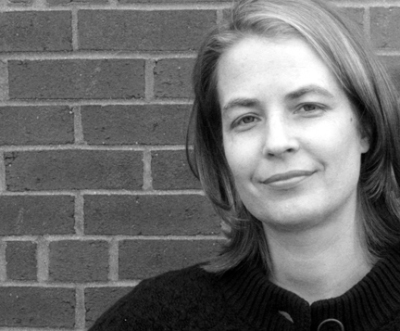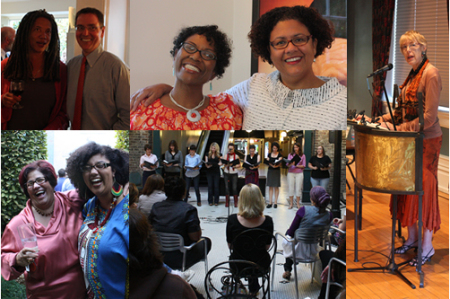Katerina Stoykova-Klemer’s Interview with Conference Director Julie Wrinn

Julie Kuzneski Wrinn became director of the conference in 2007 after serving for three years on its board of directors. A native of Indiana, Pennsylvania, she received Bachelor’s and Master’s Degrees in English from the University of Virginia. A ten-year veteran of the book publishing business, she held editorial positions at several publishers in Washington, D.C., most notably at Counterpoint Press, the esteemed independent publisher. She lives in Lexington, Kentucky, with her husband and two young sons.
Julie, could you please give the readers of Public Republic a brief overview of the Kentucky Women Writers Conference and its mission?
The Kentucky Women Writers Conference is a literary festival for readers and writers, women and men, celebrating the work of contemporary women writers. It is the longest running event of its kind in the United States and the only annual conference featuring contemporary writers, exclusively women, in a series of workshops, readings, and discussions. I have been director since 2007.
How did the conference first get started, and who are some notable presenters who have been featured over the years?
The University of Kentucky held its first Women Writers Conference in 1979. Alice Walker came that year and read from a work-in-progress later published as The Color Purple. So the conference was born in those early days of “women’s studies” and has spanned several generations of feminism. Since then, we’ve hosted nearly 300 women writers in Lexington, including three U.S. Poet Laureates (Gwendolyn Brooks, Rita Dove, Louise Gluck) and most of Kentucky’s brightest stars, including as Kim Edwards, Nikky Finney, bell hooks, Barbara Kingsolver, and Bobbie Ann Mason.
I was pretty star-struck when we hosted Joyce Carol Oates a few years ago. People know she’s prolific, but the actual numbers are staggering: over 100 books of fiction, short stories, poetry, and essays. In person, she has fascinating things to say on pretty much any topic in the history of world literature.
Bobbie Ann Mason and Joyce Carol Oates at the September 2008 conference
Who are the featured presenters this year?
Diane Ackerman, the bestselling poet, naturalist, and author of A Natural History of the Senses and The Zookeeper’s Wife will read from her new book, Dawn Light: Dancing with Cranes and Other Ways to Start the Day. She will also lead a panel discussion with Sue Halpern on “The Importance of Nature, Human and Otherwise, to Writing.” One of the things I love about planning the conference is the opportunity to put writers into conversation with each other, especially writers who seem to share a certain artistic sensibility but may never have met, as is the case with Diane and Sue.
Joining Diane and Sue, who are primarily nonfiction writers, are poets Jennifer Chang, Simone Muench, and Patricia Smith; novelists C.E. Morgan, Mary Ann Taylor-Hall, and Valerie Wilson Wesley; Heather Sellers, the acclaimed writing teacher, poet, and fiction writer; and literary agent Erin Cox. These 10 make up our roster of featured presenters, and they will be joined by about 10 more special guests who are writers, editors, and publishers residing in Kentucky.
What are some events that the general public can attend?
We offer two full days of workshops for writers at all stages of development, but we also offer panel discussions and readings for anyone who loves to read. Writers need readers, obviously, and our event is about bringing these two groups together. Furthermore, the best writers are almost always voracious readers, whose most profound relationships are with books and other authors. Very frequently our speakers convey this ethic, the necessity of reading deeply and widely in order to achieve your potential as a writer.
The general public is also welcome at free events on Friday, Saturday, and Sunday nights, September 10, 11, and 12, 2010. Friday night is the Gypsy Poetry Slam, a spoken word competition with audience judging, featuring slam champion Patricia Smith, who was a National Book Award finalist for Blood Dazzler, her 2008 book of poems about Hurricane Katrina. This is Patricia’s second visit to Lexington, and we are thrilled to have her share this stunning book on the fifth anniversary of Katrina.
Saturday night is Diane Ackerman’s reading, mentioned earlier, and Sunday night wraps up the conference with a reading of new work by C.E. Morgan. Catherine Morgan’s first novel, All the Living, is one of the most acclaimed debuts by a Kentuckian in recent memory. In it, a love triangle unfolds on a Kentucky tobacco farm, and the book won the 2009 Pen/Hemingway Award, earning its author recognition as one of “5 under 35” best writers in the United States by the National Book Foundation. Morgan’s short story “Twins” appeared recently in the New Yorker magazine, and it will be the basis of Morgan’s second novel, from which she will read on Sunday night. She will be joined by poet Kathleen Driskell and novelist Crystal Wilkinson, two beloved Kentucky authors in their own right who are also bringing new work to share.

Thirtieth anniversary of the Kentucky Women Writers Conference, September 2009. Clockwise from top left: poet Nikky Finney with Lexington Vice Mayor Jim Gray, poets Honoree Fanonne Jeffers and Elizabeth Alexander, fiction writer and Kentucky Foundation for Women founder Sallie Bingham, group performance at the Gypsy Poetry Slam, poets Bianca Spriggs (in blue)and Marta Miranda (in pink).
What are some activities that are leading up to the conference?
We’ve held monthly book groups on conference authors to familiarize the community with the writers who will be here in September. We will also hold a “Wild Women of Poetry” reading a local bar one week before the conference, featuring Kentucky poets performing their work.
Do men attend the conference?
They do! They’re definitely in the minority, but we do what we can to make them feel welcome. Because only the most enlightened sort of men are going to attend, they haven’t detracted from the spirit of sisterhood that permeates every aspect of the conference, from the feeling of “women mentoring women.” These are guys who proudly refer to themselves as feminists, who don’t shy away from that label, and who recognize what a rare opportunity our conference offers for experiencing world-class authors.
What would you like to see preserved and strengthened? How do you see the conference growing or changing in the future?
It is astonishing to me how the University of Kentucky and the surrounding community have kept this conference going every year since 1979. It’s a testament to the importance our region places on books and the life of the mind. I also think Kentuckians possess a vivid sense of place, from which all sort of authors and artists have been able to draw inspiration.
But most people realize that the troubled economy is having a negative impact on funding for schools, and the only way to protect the future of this program is through an endowment. We’re looking for donors to endow a conference lecture series, a writing contest, and scholarships for students. We pay our presenters fairly and feature many free events, thus our daytime ticket sales cover only 10% of our operating costs. Besides the University of Kentucky, the Kentucky Foundation for Women has been our most generous sponsor for decades and an absolute lifeline during the leanest years. LexArts has become another key sponsor this past decade, as well as the Keeneland Foundation, Transylvania University, Eastern Kentucky University, and several media partners such as the Smiley Pete publications, Joseph-Beth Booksellers, and the UK radio station WUKY.
Kentucky Women Writers Conference 2010 by Accents Publishing
Director Julie Wrinn talks about the Kentucky Women Writers Conference – history, goals and significance. She also highlights specific events and presenters for the 2010 conference.
Julie, you have worked in publishing for quite a few years. Did that experience help with your position as director of the conference?
I think my experience as an editor is unusual among directors of writers conferences. I was managing editor at several book publishers in Washington, D.C., most notably Counterpoint Press, the independent publisher of Wendell Berry and several other Kentucky authors. I’ve continued to freelance edit for Counterpoint, just enough to keep those skills fresh. And I think this experience has given me perspective into the business side of writing, how the bookstores and newspapers and literary journals and agents and publishing houses all work together. Many different careers can be had if you love to read and write, and our conference can help you explore those. Our workshops can inspire a new writing project or help you complete a half-written manuscript, but they can also offer guidance with finding an agent or publicizing an already published book.
Do you have words to the listeners of accents who plan to attend the conference?
Book groups have become such a widespread phenomenon—nearly every friend I know belongs to one, as do I. People have discovered that just because you’re done with school doesn’t mean you can’t read books with other people and talk about them and gain a lot of rewarding connections while doing so. That’s the kind of experience our conference delivers.











3 comments so far ↓
Nobody has commented yet. Be the first!
Comment